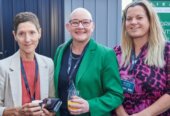It has been 551 days since Waikato Hospital doctors discovered a golf-ball-sized tumour ballooning inside Fionnlagh Adams’ brain.
At risk of death from the pressure building in her skull, the four-year-old was rushed to Starship Children’s Hospital that night, on Saturday, September 3, 2022.
Six days later, a medical team performed a nine-hour surgery to remove the medulloblastoma, an aggressive form of cancer that had grown between her brainstem and her cerebellum in just 4-6 weeks.
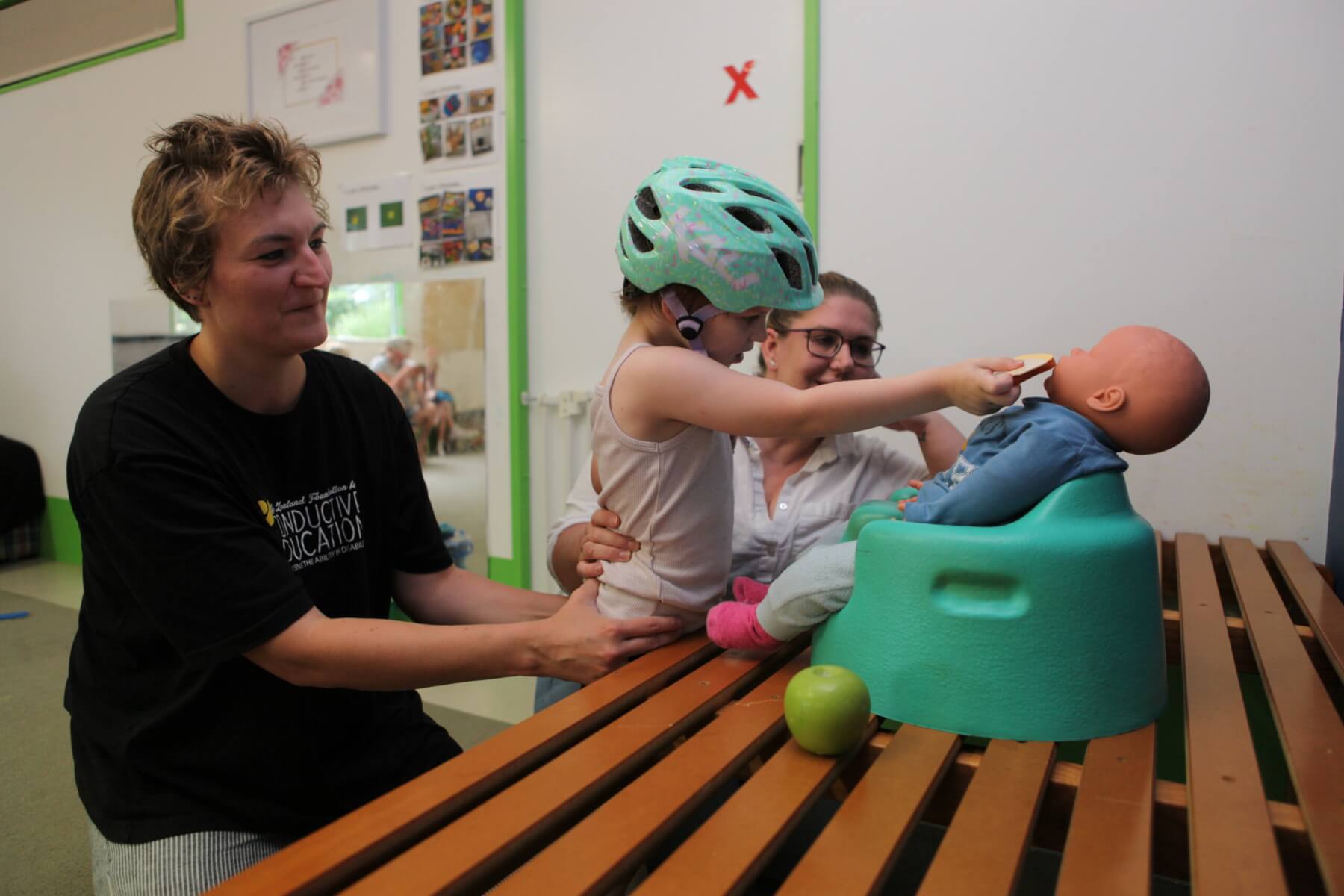
Six-year-old Fionnlagh Adams uses plastic toys to feed baby Tama watched by her mother Stacey Ross during a physical therapy session with conductive education practitioner Melinda Ashton (left).
“Now that we go back and look at the symptoms – the droopy eye, the extra tiredness, the lower appetite, the poor coordination, the sleepiness, the vomiting – they are all signs that there is a neurological problem,” Fionnlagh’s mother, Stacey Ross, said.
“But, despite four doctor visits over the previous month, no one picked it up.”
When Fionnlagh was admitted to Starship, Stacey and her husband Jonathan Adams vowed to do everything possible to save their daughter.
“And we have,” Stacey said. “We’ve done everything the doctors told us to do.”
Fionnlagh’s operation left her suffering from posterior fossa syndrome, a condition characterised by a range of neurological problems including muscle weakness and speech difficulties.
“When she woke up, she couldn’t move,” Stacey said.
“She couldn’t walk, she couldn’t talk, she couldn’t open up her eyes. She could breathe, thankfully. She could breathe by herself, but that’s about all she could do.”
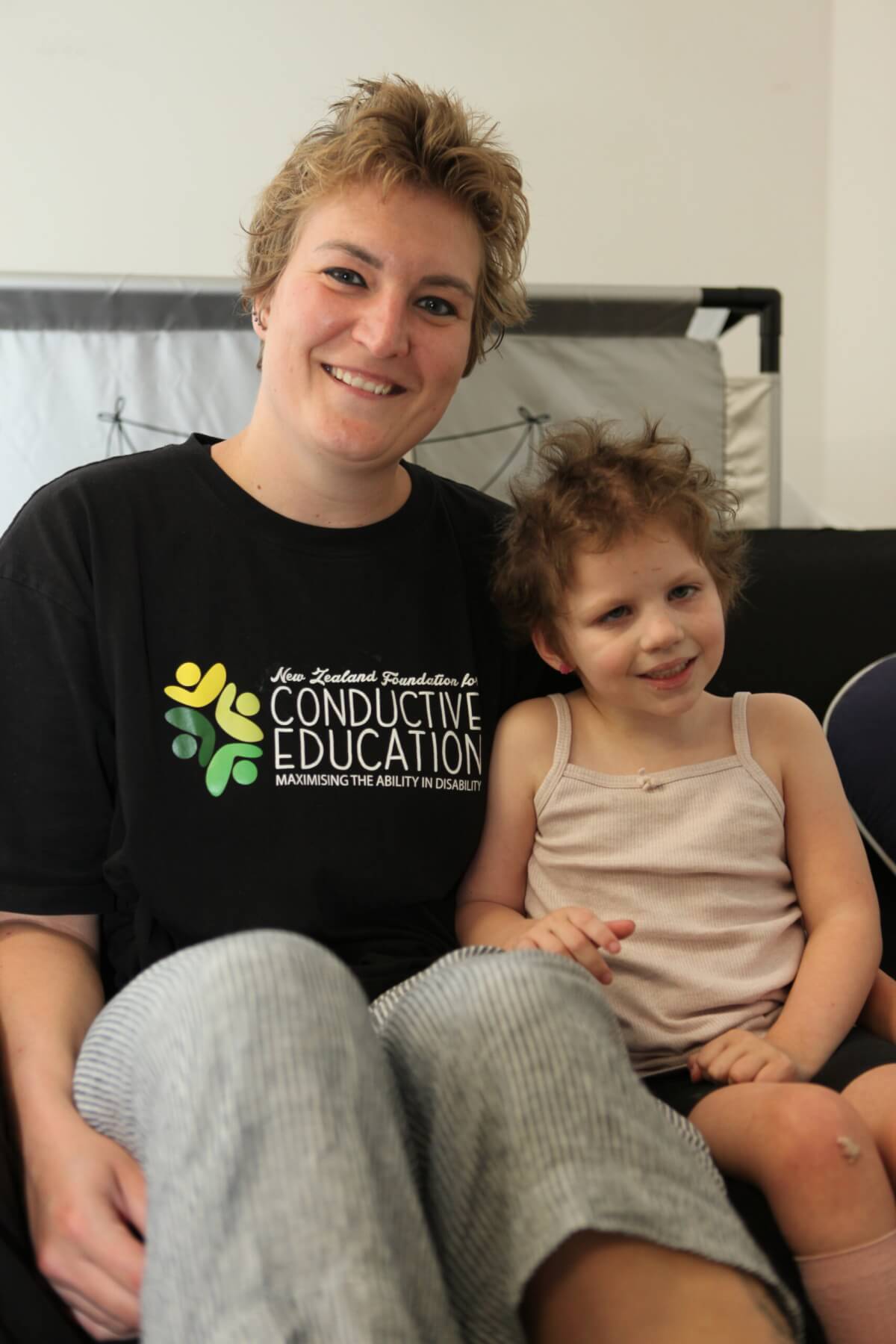
Fionnlagh Adams takes a break with her therapist Melinda Ashton during a session at Conductive Education Waikato in Hamilton.
In the days since, Fionnlagh has had “countless MRIs”, four brain surgeries, ovarian harvest surgery and 30 doses of radiation requiring general anaesthetic.
“She’s had horrific chemotherapy – she lost all of her hair, all of her eyebrows, her little eyelashes, all of it gone, everything – but we chose to save now and fix later,” Stacey said.
“We were like, so long as we get through it all and have her at the end of it then we’ve done the right thing.”
Stacey admits she simply doesn’t have the energy to begin processing her grief around everything her family has been through over the past 18 months.
“If I sit there and I think about it, or I focus on it too much, I’m not going to be able to get up in the morning,” she said.
“At the moment it’s just easier to like, push it to the side, be busy and just get on with life.”
Today, that’s exactly what she’s doing.
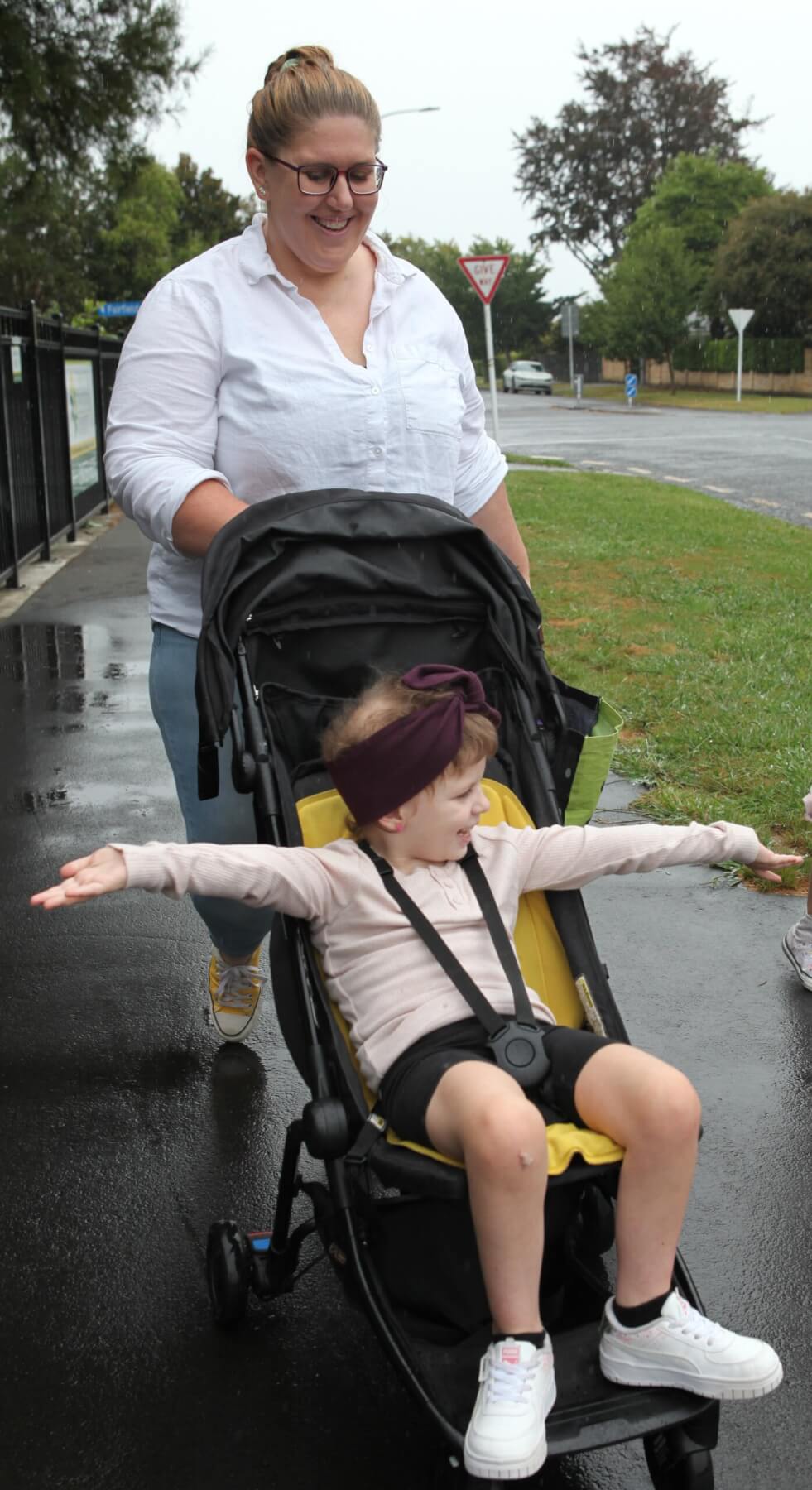
Fionnlagh, pushed by her mother Stacey Ross, catches raindrops as she leaves her therapy session at Conductive Education Waikato in Hamilton.
After making sure their homeschool lessons are completed by midday, Stacey piles her five children into the car and takes the now familiar trip from their family home in Ohaupo to Conductive Education Waikato.
The government-funded unit, integrated into Woodstock Primary School in Hamilton, provides a family-focused child development service for children with learning, communication or mobility challenges.
Shortly after 1pm on February 22, Fionnlagh, now six years old, is working with her conductive education practitioner, Melinda Ashton.
Her arms and legs trembling with effort, Fionnlagh crawls across the cream carpet of her therapy room and makes her way unsteadily towards a plastic air cushion, which Melinda helps her kneel on.
“I use it to challenge her muscles and just building muscles and working on coordination,” says Melinda.
“You can see her body has all these little shakes in it at the moment because she’s having to work pretty hard.”
A lot of things are hard for Fionnlagh now.
She can swallow again and is relearning how to talk, but her voice wobbles and her words slur together. She can crawl, but cannot walk unsupported. She has a speech language therapist and attends two conductive education sessions and two physiotherapy sessions a week.
Today, she is tired. After sitting behind a wooden frame and throwing wallet-sized beanbags over the top for a few minutes, she rubs her eyes and cries out.
“Are you okay darling?” asks Melinda, who is supporting her small body.
“Hey, big deep breath,” she says, scooping Fionnlagh into her arms and laying her cheek on the girl’s mint green helmet. “Oh, I know. Oh, my darling. Shall we find something else?”
Fionnlagh continues working hard through the session, despite her fatigue. She places foam shapes on a wet mirror, crawls through a fabric tunnel and collects plastic food items to make a sandwich for baby doll Tama.
Every now and then she stops to hug her mum and rest her head on her shoulder, as her siblings sit along a wall playing on electronic devices.
Melinda is impressed with the progress her student has made since her first visit last July.
“Fionnlagh is amazing,” she said.
“She is absolutely amazing; her whole family is. They’re so dedicated, and all her little siblings sit there patiently waiting for their sister to do her exercises, and her parents extend all these activities at home. They’re just a really good family unit.”
Doctors are confident Fionnlagh will walk again by herself one day, but it could take years.
“People are like oh, she’s out of treatment, she’s done, life’s normal again,” Stacey said.
“But I’m like no, normal for me is not physio four times a week, it’s not having walkers and bath seats and gym equipment in my lounge. It’s not having my six-year-old not be able to walk. It’s not all of this, that’s not normal. We’re not back to normal. We are…I don’t know what we are. We’re adjusting to what our life is now.”
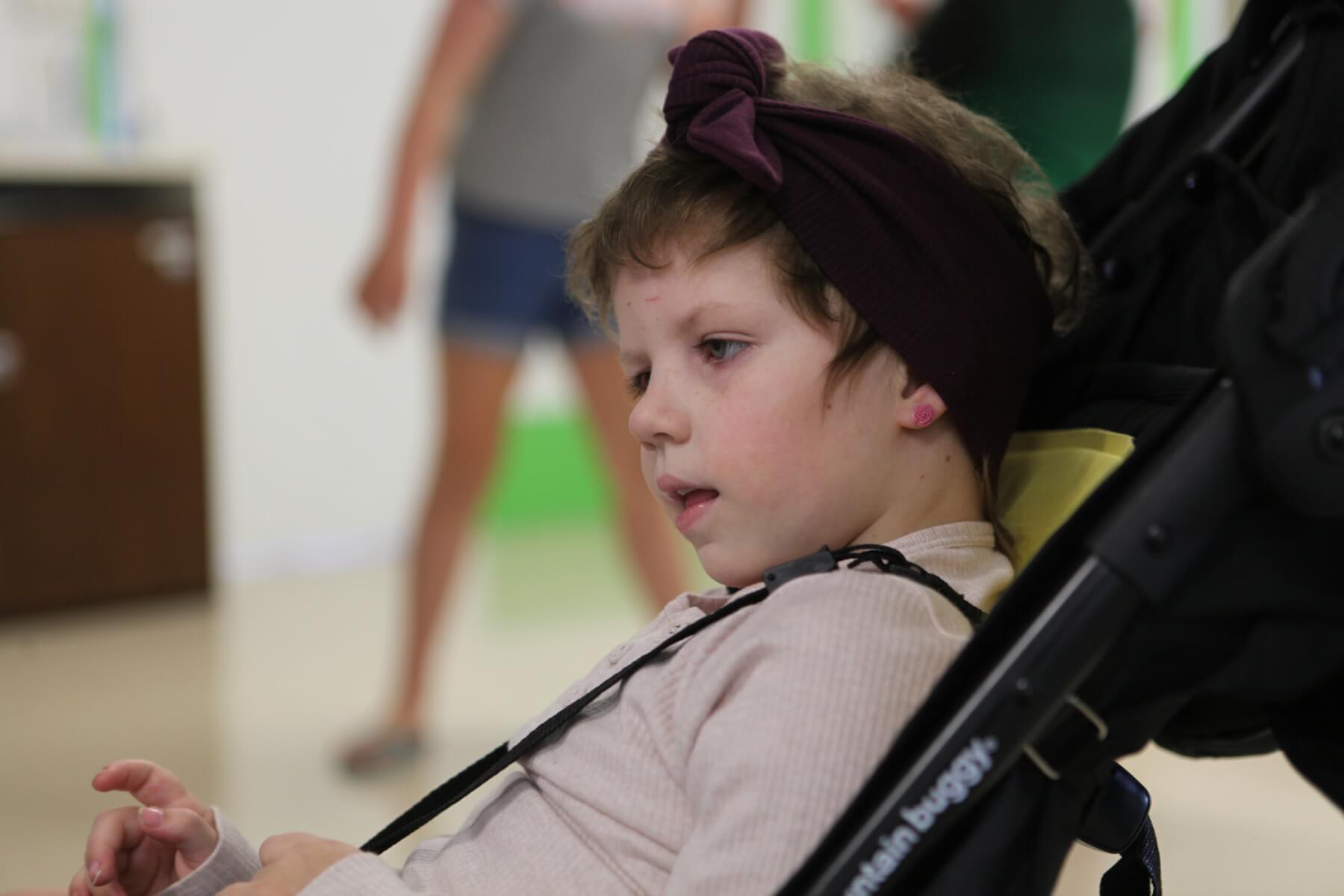
Fionnlagh waits for her four siblings in her pushchair after finishing her session at Conductive Education Waikato in Hamilton.
With the Child Cancer Foundation’s 2024 Street Appeal happening on March 8 and 9, Stacey and Jonathan were keen to share their daughter’s story.
“The Child Cancer Foundation supported our whole family,” Stacey said.
“They helped us in ways we never expected. We loved that they helped us all, from including Finn’s siblings into the beads of courage programme to organising birthday cakes for them, to inviting us all to celebrations for Christmas etc where we could meet other families facing similar challenges.
“Our family support coordinator made all the difference to this journey and we appreciate her and everything they did for us.”
The Child Cancer Foundation is currently supporting about 1100 families nationwide.
“Every week this year, three Kiwi families will be told the heartbreaking news that their child has cancer,” said chief executive Monica Briggs.
“We don’t receive any direct government funding, so these families rely on the generosity of their fellow Kiwis to receive the vital emotional and practical support they need during the toughest time in their lives.”







